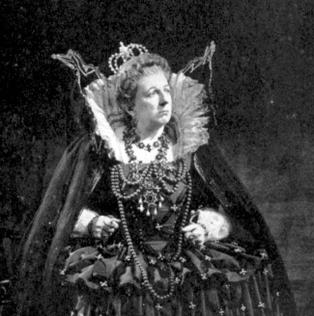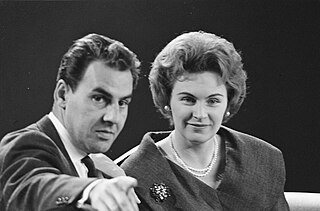Wijntje Cornelia van Zanten (Dordrecht, August 2, 1855 - The Hague, January 10, 1946) was a Dutch opera singer, singing teacher and author.

Dordrecht, historically known in English as Dort, is a city and municipality in the Western Netherlands, located in the province of South Holland. It is the fifth-largest city of the province after Rotterdam, The Hague, Zoetermeer and Leiden, with a population of 118,450. The municipality covers the entire Dordrecht Island, also often called Het Eiland van Dordt, bordered by the rivers Oude Maas, Beneden Merwede, Nieuwe Merwede, Hollands Diep, and Dordtsche Kil. Dordrecht is the largest and most important city in the Drechtsteden and is also part of the Randstad, the main conurbation in the Netherlands. Dordrecht is the oldest city in Holland and has a rich history and culture.

The Hague is a city on the western coast of the Netherlands and the capital of the province of South Holland. It is also the seat of government of the Netherlands and hosts the International Court of Justice, one of the most important courts in the world.
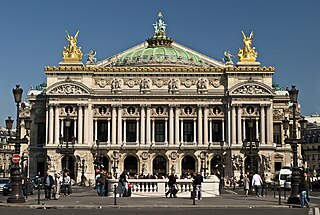
Opera is a form of theatre in which music has a leading role and the parts are taken by singers, but is distinct from musical theater. Such a "work" is typically a collaboration between a composer and a librettist and incorporates a number of the performing arts, such as acting, scenery, costume, and sometimes dance or ballet. The performance is typically given in an opera house, accompanied by an orchestra or smaller musical ensemble, which since the early 19th century has been led by a conductor.
Van Zanten, who sang both mezzo-soprano and alto, also wrote her name as Cornélie or Cornelie and was known among friends as Corry or Kee.
A mezzo-soprano or mezzo (, ; Italian pronunciation: [ˈmɛddzo soˈpraːno] meaning "half soprano") is a type of classical female singing voice whose vocal range lies between the soprano and the contralto voice types. The mezzo-soprano's vocal range usually extends from the A below middle C to the A two octaves above (i.e. A3–A5 in scientific pitch notation, where middle C = C4; 220–880 Hz). In the lower and upper extremes, some mezzo-sopranos may extend down to the F below middle C (F3, 175 Hz) and as high as "high C" (C6, 1047 Hz). The mezzo-soprano voice type is generally divided into the coloratura, lyric, and dramatic mezzo-soprano.
The musical term alto, meaning "high" in Italian, historically refers to the contrapuntal part higher than the tenor and its associated vocal range. In 4-part voice leading alto is the second highest part, sung in choruses by either low women's or high men's voices. In vocal classification these are usually called contralto and male alto or countertenor.
She studied at the conservatory of Cologne, among others, and then continued her studies in Milan under Francesco Lamperti. In September 1875 she made her debut in Turin, singing the role of Leonora in Donizetti's opera La Favorita. In 1879 she left Italy for Germany, where she sang at the opera of Breslau, Kassel (with Gustav Mahler as conductor) and Hamburg. During her German period she also composed a number of Lieder , including Mijn Moedertaal ("My Mother Tongue") in 1881.

Cologne is the largest city of Germany's most populous federal state of North Rhine-Westphalia and the fourth most populous city in Germany after Berlin, Hamburg, and Munich. With slightly over a million inhabitants within its city boundaries, Cologne is the largest city on the Rhine and also the most populous city both of the Rhine-Ruhr Metropolitan Region, which is Germany's largest and one of Europe's major metropolitan areas, and of the Rhineland. Centered on the left bank of the Rhine, Cologne is about 45 kilometres (28 mi) southeast of North Rhine-Westphalia's capital of Düsseldorf and 25 kilometres (16 mi) northwest of Bonn. It is the largest city in the Central Franconian and Ripuarian dialect areas.

Milan is a city in northern Italy, capital of Lombardy, and the second-most populous city in Italy after Rome, with the city proper having a population of 1,395,274 while its metropolitan city has a population of 3,259,835. Its continuously built-up urban area has a population estimated to be about 5,270,000 over 1,891 square kilometres. The wider Milan metropolitan area, known as Greater Milan, is a polycentric metropolitan region that extends over central Lombardy and eastern Piedmont and which counts an estimated total population of 7.5 million, making it by far the largest metropolitan area in Italy and the 54th largest in the world. Milan served as capital of the Western Roman Empire from 286 to 402 and the Duchy of Milan during the medieval period and early modern age.
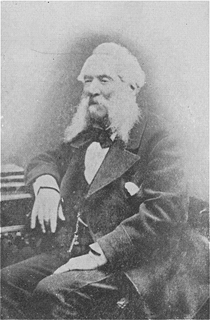
Francesco Lamperti was an Italian singing teacher.
In 1885 she was invited to join the American Opera Company at the Metropolitan Opera House in New York City. Soon after, she joined the National Opera Company for a lengthy tour of North America in the 1886-1887 season. Highlights of the tour were her roles as Orpheus in Gluck's Orfeo ed Euridice and the title role in Carmen by Bizet. After the company went bankrupt, she returned to Europe and worked in Russia (where she sang a complete Der Ring des Nibelungen by Wagner), in the Netherlands (where she sang at the Hollandsche Opera and the Nederlandse Opera), and in Germany.
The American Opera Company was the name of four different opera companies active in the United States. The first company was a short-lived opera company founded in New York City in February, 1886 that lasted only one season. The second company was based out of Rochester, New York, and was active from the mid-1920s up until 1930 when it went bankrupt not too long after the Wall Street Crash of 1929. The third opera company was a short lived company located in Trenton, New Jersey that was active in 1937. The fourth and last opera company was actively performing in Philadelphia from 1946 through 1950.

The City of New York, usually referred to as either New York City (NYC) or simply New York (NY), is the most populous city in the United States. With an estimated 2018 population of 8,398,748 distributed over a land area of about 302.6 square miles (784 km2), New York is also the most densely populated major city in the United States. Located at the southern tip of the state of New York, the city is the center of the New York metropolitan area, the largest metropolitan area in the world by urban landmass and one of the world's most populous megacities, with an estimated 19,979,477 people in its 2018 Metropolitan Statistical Area and 22,679,948 residents in its Combined Statistical Area. A global power city, New York City has been described as the cultural, financial, and media capital of the world, and exerts a significant impact upon commerce, entertainment, research, technology, education, politics, tourism, art, fashion, and sports. The city's fast pace has inspired the term New York minute. Home to the headquarters of the United Nations, New York is an important center for international diplomacy.

Christoph WillibaldGluck was a composer of Italian and French opera in the early classical period. Born in the Upper Palatinate and raised in Bohemia, both part of the Holy Roman Empire, he gained prominence at the Habsburg court at Vienna. There he brought about the practical reform of opera's dramaturgical practices for which many intellectuals had been campaigning. With a series of radical new works in the 1760s, among them Orfeo ed Euridice and Alceste, he broke the stranglehold that Metastasian opera seria had enjoyed for much of the century. Gluck introduced more drama by using simpler recitative and cutting the usually long da capo aria. His later operas have half the length of a typical baroque opera.
Van Zanten ended her singing career in 1895 and accepted a position as senior professor of solo singing at the Amsterdam conservatory, coaching many well-known Dutch singers such as Jos Tijssen, Julia Culp and Tilly Koene.
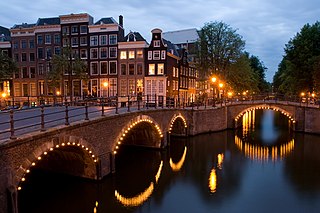
Amsterdam is the capital and most populous city of the Netherlands, with a population of 866,737 within the city proper, 1,380,872 in the urban area, and 2,410,960 in the metropolitan area. Amsterdam is in the province of North Holland. Amsterdam is colloquially referred to as the "Venice of the North" due to its large number of canals which are a UNESCO World Heritage Site.

Julia Bertha Culp, the "Dutch nightingale", was an internationally celebrated mezzo-soprano in the years 1901–1919.
She left Amsterdam for Berlin in 1903 to lead a Meisterschule für Kunstgesang (singing school), but returned to the Netherlands when World War I broke out. In 1914 she settled in The Hague, where she remained active as a teacher of classical singing. She lived to see the end of World War II and died in 1946, aged 90.

Berlin is the capital and largest city of Germany by both area and population. Its 3,748,148 (2018) inhabitants make it the second most populous city proper of the European Union after London. The city is one of Germany's 16 federal states. It is surrounded by the state of Brandenburg, and contiguous with Potsdam, Brandenburg's capital. The two cities are at the center of the Berlin-Brandenburg capital region, which is, with about six million inhabitants and an area of more than 30,000 km², Germany's third-largest metropolitan region after the Rhine-Ruhr and Rhine-Main regions.

World War I, also known as the First World War, the Great War, the Seminal Catastrophe, and initially in North America as the European War, was a global war originating in Europe that lasted from 28 July 1914 to 11 November 1918. Contemporaneously described as "the war to end all wars", it led to the mobilisation of more than 70 million military personnel, including 60 million Europeans, making it one of the largest wars in history. It is also one of the deadliest conflicts in history, with an estimated nine million combatants and seven million civilian deaths as a direct result of the war, while resulting genocides and the resulting 1918 influenza pandemic caused another 50 to 100 million deaths worldwide.

World War II, also known as the Second World War, was a global war that lasted from 1939 to 1945. The vast majority of the world's countries—including all the great powers—eventually formed two opposing military alliances: the Allies and the Axis. A state of total war emerged, directly involving more than 100 million people from more than 30 countries. The major participants threw their entire economic, industrial, and scientific capabilities behind the war effort, blurring the distinction between civilian and military resources. World War II was the deadliest conflict in human history, marked by 70 to 85 million fatalities, most of whom were civilians in the Soviet Union and China. It included massacres, the genocide of the Holocaust, strategic bombing, premeditated death from starvation and disease, and the only use of nuclear weapons in war.
Van Zanten recorded her extensive knowledge of the art of singing and the workings of the human voice in a number of books, which appeared in both Dutch and German. Her book Bel Canto des Wortes: Lehre der Stimmbeherschung durch das Wort (1911) was considered a standard work for the teaching of classical singing. In 1923 she even made a film about the human voice. However, she never took the opportunity to make any recordings of her singing.


